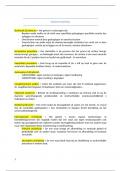Chapter 11- Company Law
The legal form of a company
A business can be run in different legal forms. The choice of legal form important
because it determines how the business must be established and run and the extent
of one’s liability towards business debts.
1. Unincorporated: Company composed of natural person and has no separate legal
identity.
Natural persons are the company.
So, the liability of natural person is unlimited in case of bankruptcy
(personally liable for any company debt).
Personal liability means that the individuals who make up the
company are unrestrictedly liable for any company debts.
Liability reaches beyond the scope of what is invested in the
company. May affect all private means of the members of the
company.
Regulated in the sphere of normal contract laws.
a) A sole proprietorship is a legal form of an unincorporated business that is
composed of one individual who is personally liable for the company’s debts.
Simplest form of unincorporated company.
Easy to set up, free prerequisites (if any).
No separate tax obligation on behalf of business.
Owner is fully liable for the business and its debts.
If owner is married, property and means of the couple is
shared; so, the partner’s property can also be used to settle
debt in case of bankruptcy of the business.
Sole owner but may have other employees.
e.g., Suzy opens a business. She invests 200k. The business goes bankrupt.
Suzy had also taken loans from the bank and owes them 500k. Because it is
a sole proprietorship, Suzy must either sell her personal assets (car, house,
jewellery) or get it taken by the bank to repay the bank since the business
assets aren’t sufficient to pay back the debt. Suzy still owes 100k to the
, bank. As Suzy is married, her husbands’ personal assets are also seized by
the bank to fully repay the business’ debt.
b) A partnership is a legal form of an unincorporated business that is
composed of more than one individual who are personally liable for the
company’s debts.
i) General partnership - Private agreement between two or more
partners (who share their resources to do business)
Partners are jointly liable in case of debt/bankruptcy.
Used in medium and small companies where players
play a very active role in the company.
Some jurisdictions make distinction between
partnerships between professionals (e.g., lawyers) and
commercial activities
The relationship can be regulated by a partnership
contract (limits to authority, amount of investment etc.
is stipulated)- However, this is a contract between the
partners and not between the company and third parties.
So, all partners are still jointly liable against a third party,
even if it is only one partner’s fault (The other partner can
later sue the partner at fault, but this comes under contract
law. The third party doesn’t care about the workings of the
business, they just want the debt paid by the company).
e.g., Tom, Dick, and Harry each invest 200k in a business. Since the
company and them share the same legal identity, in case of
bankruptcy, all of them are personally liable for the company’s
debt, and if the company’s assets aren’t enough, all of them are
personally liable to repay the debt.
Additionally, the three signed a partnership contract with
each other, which stated that Tom wasn’t allowed to
handle clients. Tom did so anyway, and the deal with the
client went south, which caused the bankruptcy. Dick and
Harry can sue Tom for this later. (All three still have to
come together to repay the debt).
ii) Limited partnership - Same rules as general partnership but in
addition to normal partners, some partners (investors) may have
limited liability i.e., partners who only contribute financially and not
active in the management of the business itself.
The legal form of a company
A business can be run in different legal forms. The choice of legal form important
because it determines how the business must be established and run and the extent
of one’s liability towards business debts.
1. Unincorporated: Company composed of natural person and has no separate legal
identity.
Natural persons are the company.
So, the liability of natural person is unlimited in case of bankruptcy
(personally liable for any company debt).
Personal liability means that the individuals who make up the
company are unrestrictedly liable for any company debts.
Liability reaches beyond the scope of what is invested in the
company. May affect all private means of the members of the
company.
Regulated in the sphere of normal contract laws.
a) A sole proprietorship is a legal form of an unincorporated business that is
composed of one individual who is personally liable for the company’s debts.
Simplest form of unincorporated company.
Easy to set up, free prerequisites (if any).
No separate tax obligation on behalf of business.
Owner is fully liable for the business and its debts.
If owner is married, property and means of the couple is
shared; so, the partner’s property can also be used to settle
debt in case of bankruptcy of the business.
Sole owner but may have other employees.
e.g., Suzy opens a business. She invests 200k. The business goes bankrupt.
Suzy had also taken loans from the bank and owes them 500k. Because it is
a sole proprietorship, Suzy must either sell her personal assets (car, house,
jewellery) or get it taken by the bank to repay the bank since the business
assets aren’t sufficient to pay back the debt. Suzy still owes 100k to the
, bank. As Suzy is married, her husbands’ personal assets are also seized by
the bank to fully repay the business’ debt.
b) A partnership is a legal form of an unincorporated business that is
composed of more than one individual who are personally liable for the
company’s debts.
i) General partnership - Private agreement between two or more
partners (who share their resources to do business)
Partners are jointly liable in case of debt/bankruptcy.
Used in medium and small companies where players
play a very active role in the company.
Some jurisdictions make distinction between
partnerships between professionals (e.g., lawyers) and
commercial activities
The relationship can be regulated by a partnership
contract (limits to authority, amount of investment etc.
is stipulated)- However, this is a contract between the
partners and not between the company and third parties.
So, all partners are still jointly liable against a third party,
even if it is only one partner’s fault (The other partner can
later sue the partner at fault, but this comes under contract
law. The third party doesn’t care about the workings of the
business, they just want the debt paid by the company).
e.g., Tom, Dick, and Harry each invest 200k in a business. Since the
company and them share the same legal identity, in case of
bankruptcy, all of them are personally liable for the company’s
debt, and if the company’s assets aren’t enough, all of them are
personally liable to repay the debt.
Additionally, the three signed a partnership contract with
each other, which stated that Tom wasn’t allowed to
handle clients. Tom did so anyway, and the deal with the
client went south, which caused the bankruptcy. Dick and
Harry can sue Tom for this later. (All three still have to
come together to repay the debt).
ii) Limited partnership - Same rules as general partnership but in
addition to normal partners, some partners (investors) may have
limited liability i.e., partners who only contribute financially and not
active in the management of the business itself.










